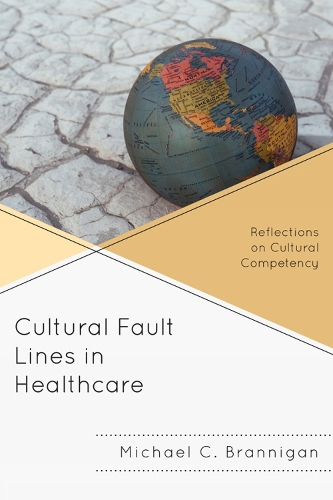
Cultural Fault Lines in Healthcare: Reflections on Cultural Competency
(Paperback)
Publishing Details
Cultural Fault Lines in Healthcare: Reflections on Cultural Competency
By (Author) Michael C. Brannigan
Bloomsbury Publishing PLC
Lexington Books
19th December 2011
United States
Classifications
Professional and Scholarly
Non Fiction
Social discrimination and social justice
Ethnic studies / Ethnicity
362.1
Physical Properties
Paperback
122
Width 156mm, Height 230mm, Spine 8mm
186g
Description
Healthcare in the U.S. faces two interpenetrating certainties. First, with over 66 racial and ethnic groupings, our American Mosaic of worldviews and values unavoidably generates clashes in hospitals and clinics. Second, our public increasingly mistrusts our healthcare system and delivery. One certainty fuels the other. Conflicts in the clinical encounter, particularly with patients from other cultures, often challenge dominant assumptions of morally appropriate principles and behavior. In turn, lack of understanding, misinterpretation, stereotyping, and outright discrimination result in poor health outcomes, compounding further mistrust.
To address these cultural fault lines, healthcare institutions have initiated efforts to ensure cultural competence. Yet, these efforts become institutional window-dressing without tackling deeper issues, issues having to do with attitudes, understanding, and, most importantly, ways we communicate with patients. These deeper issues reflect a fundamental, original fault line: the ever-widening gap between serving our own interests while disregarding the concerns of more vulnerable patients, those on the margins, those Others who remain disenfranchised because they are Other.
This book examines this and how we must become the voice for these Others whose vulnerability and suffering are palpable. The author argues that, as a vital and necessary condition for cultural competency, we must learn to cultivate the virtue of Presence - of genuinely being there with our patients. Cultural competency is less a matter of acquiring knowledge of other cultures. Cultural competency demands as a prerequisite for all patients, not just for those who seem different, genuine embodied Presence.
Genuine, interpersonal, embodied presence is especially crucial in our screen-centric and Facebook world where interaction is mediated through technologies rather than through authentic face-to-face engagement. This is sadly apparent in healthcare, where we have replaced interpersonal care with technological intervention. Indeed, we are all potential patients. When we become ill, we too will most likely assume roles of vulnerability. We too may feel as invisible as those on the margins.
These are not armchair reflections. Brannigans incisive analysis comes from his scholarship in healthcare and intercultural ethics, along with his longstanding clinical experience in numerous healthcare settings with patients, their families, and healthcare professionals.
Reviews
This is a book about the nature of cultural competency, its vital significance in healthcare, and the social and cultural barriers to achieving it that exist both in the process of American medical education and in the American system of health care delivery. It has a meta-message about what Brannigan regards as the virtue of presence how health professionals ideally should relate to, and communicate with patients and their families. -- Renee C. Fox, Annenberg Professor Emerita of the Social Sciences, Department of Sociology, University of Pennsylvania
This book provides an opportunity for students and health care practitioners to reflect upon the philosophical meaning of "cultural competency." Using examples/scenarios from different cultures, Brannigan (College of Saint Rose) offers insights as a bioethicist on how to unveil the essence of cultural competency through the cultivation of presence. This intriguing work is important because American society consists of at least 66 diverse racial and ethnic groups with multiple values and worldviews. When members of diverse groups access the Western biomedical health care system, multiple clashes and conflicts can occur. To bridge these differences in cross-cultural communication, Brannigan offers insight from his work with multicultural patients and their families and caregivers. Chapter 1 discusses the challenges of colliding worldviews in pluralistic American society and health care. Chapter 2 defines cultural competency, and three critical values to understand culture: space, time, and modes of communication. In the final three chapters, Brannigan advocates for the cultivation of a "face-to-face engagement or being-with the patient" as an approach to improve patient-provider interactions. Strategies to cultivate presence in health care interactions may include active listening, pace, and reciprocity. A valuable resource for students and health care practitioners interested in the subject of cultural competency. Summing Up: Highly recommended. * Choice Reviews *
Author Bio
Michael C. Brannigan (Ph.D., Philosophy, M.A., Religious Studies, University of Leuven, Belgium) is the George and Jane Pfaff Endowed Chair in Ethics and Moral Values at The College of Saint Rose in Albany, New York. Holder of the first endowed chair in the colleges history, he is also on the faculty of the Alden March Bioethics Institute at Albany Medical College. Prior to his appointment, he was Vice President for Clinical and Organizational Ethics at the Center for Practical Bioethics in Kansas City, Missouri. Before that, he was Founder and Executive Director of the Institute for Cross-Cultural Ethics at La Roche College, Pittsburgh, Pennsylvania. To complement his rich and longstanding clinical experience as an ethics consultant, hospital ethics committee advisor, and hospice volunteer, his specialty lies in ethics, Asian philosophy, medical ethics, and intercultural ethics. Along with numerous articles, his books include: Ethics Across Cultures; Striking a Balance: A Primer in Traditional Asian Values; The Pulse of Wisdom: The Philosophies of India, China, and Japan; Healthcare Ethics in a Diverse Society (co-authored); Cross-Cultural Biotechnology; and Ethical Issues in Human Cloning. He serves on the editorial boards of Health Care Analysis: An International Journal of Health Care Philosophy and Policy and Communication and Medicine. He also writes a monthly column on ethics for the Albany Times Union, at http://www.timesunion.com/brannigan/. Michael was born in Fukuoka, Japan. He and his wife Brooke, along with their dog Seamus, live in Niskayuna, New York. For fun, he plays piano, guitar, tennis, ocean kayaks, and practices martial arts.
